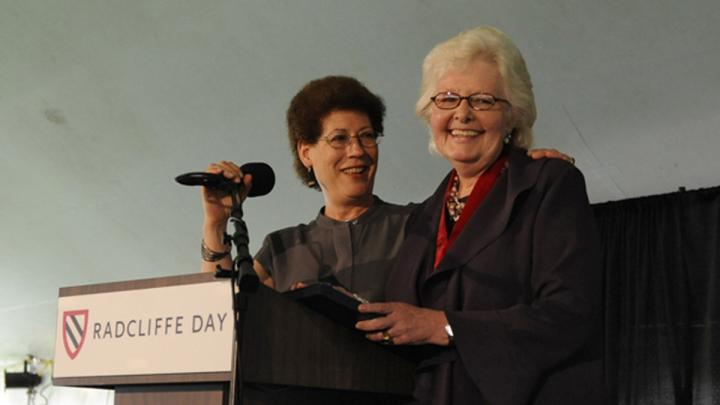Margaret Marshall, Ed.M. ’69, Ed ’77, L ’78, grew up in Newcastle, South Africa, during a time when the government controlled the courts and judges were powerless to declare laws passed by the apartheid parliament inhumane. Today, as she accepted the Radcliffe Medal, the first female Chief Justice of the Massachusetts Supreme Judicial Court stressed the critical importance of fair and impartial courts in the American legal system. Furthermore, she voiced concern that recent trends imperil the judiciary’s status and may move the United States in an authoritarian direction.
Citing former Republican presidential contender Newt Gingrich’s statement that he would ignore the Supreme Court if elected—he called it the least powerful and least accountable arm of government—as well as congressional leaders who have vowed to “punish” judges for unpopular opinions, Marshall argued that Americans are currently witnessing a full-scale assault on the “foundational notion that judges should decide cases on the facts and laws alone.”
“Increasingly strident politicians have been taking to the airwaves arguing that judges should not be neutral, should not be impartial, but should check the opinion polls before issuing a decision,” Marshall said. “The assaults are not confined to a few state legislators who file bills to jail judges for unpopular opinions. The assaults are being mounted at the highest levels.”
Marshall, who during her 14 years on the Supreme Judicial Court wrote more than 300 opinions, alluded to the way in which the First Amendment is being used “as a Trojan horse” by those who seek to “undermine the notion of impartial justice,” citing the 2002 Supreme Court ruling in the case of Republican Party of Minnesota v. White as a prime example. In a 5-4 opinion, the court ruled that Minnesota's requirement (in the state canons of judicial conduct) that judges refrain from publicly discussing their views on “disputed legal or political issues” was unconstitutional. Marshall said the most disturbing aspect of this case was the “short shrift given by the Court to the very notion that judges must be, or even can be, impartial.”
The White decision, Marshall said, opened “a Pandora’s box of noxious influences on the principle, and the reality, of fair, impartial justice in our state courts.” The ruling opened the door, Marshall noted, for judges in other jurisdictions to “strike down other rules of judicial ethics aimed at ensuring the integrity of our courts,” including rules prohibiting “judges and judicial candidates from promising in advance to decide certain cases a certain way,” or from personally soliciting campaign donations.
Citing the words of the first woman seated on the U.S. Supreme Court, Sandra Day O’Connor—a former Radcliffe medalist who has been vocal about the need to select state judges based on merit, not on their ability to win elections—Marshall said constitutional democracy is the best weapon to ensure this debate will take place “according to the rule of law and not the law of the ideologue or the law of the mob.”
“Do we here in this great country really want a legal system where judges write for popularity and not for justice?” Marshall asked, before adding: “The warning signs are there for all to see. The question is: have we the will to protect the structure of government that for so long has protected us?”








